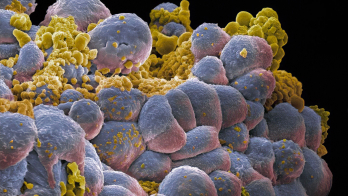
The second Future Circular Collider (FCC) physics workshop was held at CERN on 15–19 January, gathering particle physicists from around the world for talks and detailed discussions on the physics capabilities of future electron–positron, electron–proton, and proton–proton colliders.
The FCC study, which emerged following the 2013 European Strategy for Particle Physics, is a five-year project led by CERN to investigate a circular collider built in a new 100 km-circumference tunnel in the Geneva region. Such a tunnel could host an e+e– collider (called FCC-ee), a 100 TeV proton–proton collider (FCC-hh) or an electron–proton collider (FCC-eh). Further opportunities include the collision of heavy ions in FCC-hh and FCC-eh, and fixed-target experiments using the injector complex.
Last year saw a significant evolution in the maturity of the physics studies for these machines, with many detailed results presented. These results include new techniques to determine the properties of the Higgs boson, such as the all-important Higgs potential, and how these relate to fundamental questions at the smallest distance scales. New ideas about how to search for new particles interacting very weakly with normal matter – such as new species of neutrinos, dark photons or other new light scalar particles – were also studied in depth.
The January workshop was preceded by a dedicated meeting to determine whether the unprecedented precision of physics measurements provided by FCC machines could be compared against equally high-precision theoretical predictions.
The results of this study were affirmative, as reported on the first day of the FCC physics workshop.
A major theme that emerged during the workshop was the depth of complementarity between the capacities of the different FCC modes in exploring the questions that will remain open after the completion of the LHC programme. Combining their individual strengths will enable comprehensive exploration in search of answers to the pending questions in particle physics.







